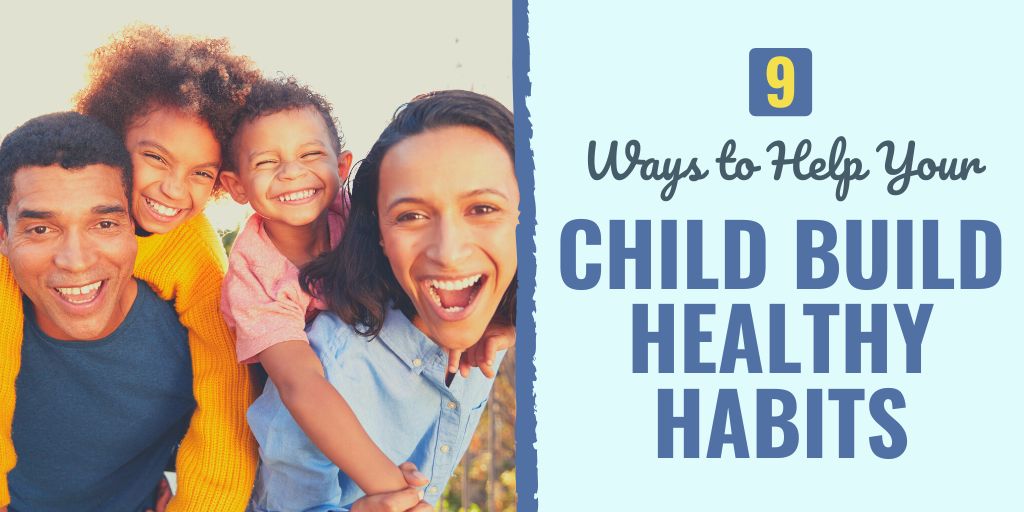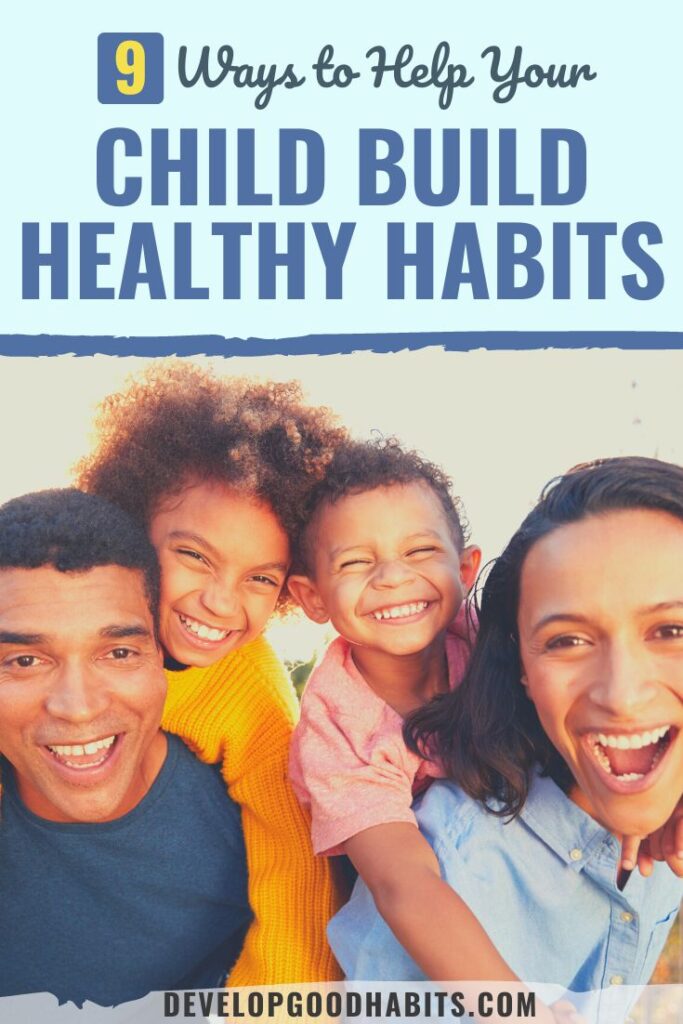As parents, our efforts are concentrated on raising our children to be independent and kind and on educating them beyond academic knowledge.
Children have an immense capacity to absorb and learn, making teaching a healthy process and helping them create healthy habits.
Encouraging your child to develop healthy habits, right from the beginning allows them to learn and make it part of their everyday life.
Habits and Why Should We Follow Them?
As adults, we can differentiate between good and bad habits. Eating a balanced diet, sleeping well, exercising regularly, etc. are good habits.
But have we ever questioned why we follow them or why they are considered the ideal way of life?
The answer to this question is straightforward. Following good habits and a healthy routine for your toddler leads to mental, physical, and emotional well-being. Healthy habits are essential to living a healthy and wholesome life.
While healthy habits are not easy to develop, it is a great practice to start in the formative years of every child. Children, as they say, are like wet cement, impressionable, and live by example.
Hence, parents must try to lead by example and show their children the right way to live.
While we are all striving to raise our children in the best possible way, let’s note a few important points on how to create the right environment to nurture their intuitive and adaptive brains.
Developing Healthy Habits
As mentioned earlier, children learn a lot from their parents. Hence, parents need to create a healthy environment at home right from eating habits, physical activity, and positivity.
All these attributes will help your child develop healthy habits from the beginning.
For example, a child raised in a home that eats a healthy, balanced diet is not prone to being a picky eater. Hence, before parenting your child, it is vital to parent yourself to build an inspiring and nurturing lifestyle for your child.
(Check out these parenting style quizzes to help you better understand yourself. We can also review the best online parenting classes here.)
1. Eating Habits
Teaching your children healthy eating habits is a great way to ensure your child leads a healthy lifestyle.
According to the Centers for Disease Control and Prevention, “Healthy eating in childhood and adolescence is important for proper growth and development and to prevent various health conditions.”
The 2015–2020 Dietary Guidelines for Americans recommend that people aged 2 years or older follow a healthy eating pattern.
Creating a palate for healthy and nourishing foods will enable your children to choose nutritious options instead of junk food. Begin with simple eating routines, like having a proper breakfast.
While breakfast is the most important meal of the day, make it a habit of preparing a healthy and fulfilling breakfast every morning for your child. Skipping breakfast has many adverse effects on health, like an increase in fat storage and a raise in blood sugar levels.
Encourage dinner time with the family to monitor their portions and discourage unhealthy and untimely snacking. Introduce various fruits and vegetables in their meals to develop a liking for all good and healthy food options.
Hence, ensuring your child has a balanced meal every day is becoming a life-long healthy habit. Children with a healthy attitude towards food grow up to be healthy and physically fit individuals.
2. Physical Activity
As much as eating right is essential, having an excellent physical activity routine in your child’s life is another great habit to instill at a young age.
As per research by The Physical Activity Guidelines for Americans, 2nd edition, “Regular physical activity will help children and adolescents improve cardiorespiratory fitness, build strong bones and muscles, control weight, reduce symptoms of depression and anxiety, and reduce the risk of developing health conditions such as cancer, Type 2 diabetes, heart diseases, High blood pressure, Obesity, and Osteoporosis.”
Other benefits include a longer attention span, good social skills, and the development of a healthy, competitive nature.
Children have a lot of energy, and if directed well, it can benefit them in many ways. While there are many benefits, it is important to understand their sensibilities and make it a fun process. Not all children are inclined towards physical activity and sports.
So, first try and understand what activity could make your child look forward to it rather than resent it. Introduce as many options as possible for your child to help them pick and choose the one that excites them the most.

3. Well-Balanced Schedule
Getting your child habituated to maintaining a well-rounded schedule right from the beginning helps create a sense of responsibility for their tasks.
For instance, scheduling television and reading time in your child’s routine will ensure they approach both activities with the same enthusiasm.
Not maintaining a balanced schedule can have adverse effects like attention deficiency, poor performance in school, obesity, and emotional and social disorders.
If your child watches a lot of television, then the time to play or read is limited and often skipped. And one thing leads to another in this vicious cycle.
On the contrary, reading can help your child learn faster, score good grades, build self-esteem, and be successful in their careers.
So, inculcate a healthy reading habit in your children by letting them choose their favorite reads and not making it feel like homework. Hence, it is essential to make learning a fun and interesting process rather than a forceful one.
A good morning routine adds structure to your day and reduces stress and anxiety. Watch the video below to learn about the six-step process for creating a great morning routine for your kids.
4. Positive Thinking
Positive thinking is a great attribute to teach your child early on in life. Being positive is a virtue that helps one see the brighter side of things. Children do not have the ability to do so until we, as parents or teachers, stimulate them in that direction.
It is straightforward for a child to be discouraged when things don’t go their way. Teaching them to learn from failures and constructively deal with negativity will help build strong individuals with good relationship with others. (Check out these positive affirmations for kids.)
However, maintaining a positive and healthy environment at home is the first step in the process. Encourage positive behavior using behavior charts, talk to them about failures, and how to accept them.
Work with them to shape a positive perspective on life and how to be resilient. (These list of house rules for your kids can help them grow into well-rounded and respectful adults.)
Developing Social Skills
One may ask why it is so important to teach your child lessons in developing good social skills. Social skills allow your child to learn and grow while understanding the dynamics of the environment they are exposed to.
Studies show that socialization and communication allow children to learn to be confident, independent, empathetic, and disciplined. Social skills not only help with interpersonal relationships but are also a great asset in any professional career.
According to What To Expect, “Socialization is a loaded term because it means more than just setting up a playdate. Babies socialize starting from birth with Mom, Dad, caregivers, siblings, and the cashier at the grocery store.
They begin to take social cues and understand how the world around them works based on everyday life. Putting your baby in different social situations teaches her to adapt and go with the flow.”
So, start by teaching your child kindness, good manners, and empathy. For instance, encouraging your child to share toys with a sibling or a friend will help them understand the dynamics of caring for others.
These traits will enable the child to understand others and treat them well. These are the foundations laid by you that will allow your child to mingle with the people in their environment with ease and confidence.
5. Communication
Communication, divided into listening and conversing, is a skill children develop very early on in their lives. A baby’s first communication begins with crying for food, sleep, or comfort.
Newborns learn to communicate by picking sounds from their environment, such as their mother’s voice, gestures, or facial expressions. They learn to communicate in a natural progression by learning to greet, taking turns while talking, or even emoting to situations like laughing at jokes, sharing their toys, etc.

The key is to involve them in interactive conversation and other activities that encourage communication. Arrange playdates or activity classes that will help your child to meet and interact with other children their age.
Ideas to develop their flair for communication:
Creating such opportunities for your child to socialize will help them develop their vocabulary and communication skills. It will also help deal with the social issues related to the child like shyness or social anxiety and be equally comfortable in other's company.
6. Empathy
Children learn to be empathetic very early in their development which can nurture them into empathetic adults. Empathetic children learn to be kind, respectful and understanding towards everyone.
Children's empathy signs have been tracked to as young as 8-10 months of age. While empathy is not a trait everyone is born with, it can be fostered by parents, caretakers, and teachers.
For instance, crying if others are in pain or being compassionate when others are upset are basic empathetic behaviors.
Children's ability to be empathetic at a very early age can be nurtured into empathetic individuals. You can be their role model by understanding and valuing their feelings.
If you give someone your shoulder to cry on, ensure your child will follow your approach when someone is sad. Evaluate feelings with your child to understand how they perceive a situation and then guide them accordingly.
However, creating a loving and positive environment for your child at home is crucial as it will help them be emotionally strong and sensitive at the same time.
7. Curiosity
Curiosity is the holy grail of knowledge. Children have a constant thirst for knowledge and understanding of the world and how everything functions.
A young child is exposed to a whole new world of tastes, smells, experiences, places, and people. The learning curve is at its highest point in this stage of life.
They are excited about going to a zoo or eating a new flavor of ice cream because they are curious and wish to familiarize themselves with the ‘new’ experience.
Why do children ask so many questions? The questions indicate their level of curiosity about the subject.
Children with curious minds can make the most of their surroundings by learning and drawing inspiration. Parents create opportunities in the form of fun learning exercises, books, shows, and peer groups.
Encourage their curiosity by appreciating their efforts to learn new things. This will also help them develop a growth mindset. (For some inspiration on conveying the idea of having a growth mindset as an essential trait for success, check out 26 of the best growth mindset bulletin boards.)
Participate equally in their quest to understand the world around them. While learning is a lifelong process, building a great foundation will help them throughout it.
It will help them utilize and guide their curiosity while creating academically and socially driven individuals.
Want your children to learn better? Teach them how to set goals while they're young. Check out these SMART goal examples for kids.
8. Social Competence
It is very important to understand the dynamics of human society in order to be a successful member of it. Children who are constantly learning about their environment are also understanding and acquiring social competencies in the process.
Traits include greeting someone appropriately, being empathetic towards others, or simply learning to coexist coherently. Social competence is the effective and appropriate way of human interactions and relationships.

The role of parents and educators in influencing social competence among children is primary. Helping children develop social competence and demonstrate positive relationships before they join school helps them approach a healthy trajectory of social and emotional development.
This attitude in children will help them solve their interpersonal conflicts, make friends, learn adjustment, and achieve academic success.
While we aim to help them acquire social competence for a happy and successful life, it is very important to give them a secure and loving environment.
Children who have a great relationship with their parents are better able to solve social problems, have empathy for others, and show fewer signs of loneliness.
Study shows that children from secure homes show more generosity towards others. Hence, while raising your children to be good human beings, it is very important for them to feel secure and loved.
9. Self-Respect
Children should be taught to respect themselves as a primary step towards teaching a social skill set.
Teaching your child self-respect allows them to value their presence, thoughts, and actions. Such individuals show a great sense of confidence and positivity. (Read these quotes about growing up to inspire you and your kids!)
The positive outcomes of this exercise are that they make rational decisions, share and care, cooperate, are patient, accept differences, focus on accomplishing tasks, and do not display negative emotions like fights, bullying, etc.
Children are raised to respect themselves and learn to respect everyone in their environment. They treat and feel equally about others. There is no room for negative connotations or feelings about others, which could lead to many negative emotions like jealousy, anger, or bullying.
So, children who come from difficult homes often show negative traits and treat others the way they have been treated or worse. Hence, start acknowledging children as responsible individuals with self-esteem, confidence, and respect to develop a growth environment.
Parents, while teaching your children to develop good and positive social skills, allow them to be children and act their age. Do not always impose they only do the right things. If they are angry with a friend or hit someone while playing, let them demonstrate that behavior.
Your approach should be to talk to them, make them realize both sides of the situation, and not lose their cool or blame them. This will help the child understand the situation wholesomely instead of creating negative feelings about the person or situation.
Final Thoughts on Helping Your Child Develop Healthy Habits
Teach your child social skills and how to create good, healthy habits in a language they understand through games, books, shows, friends, and travel. Let them look forward to subconsciously developing and hone their social skills.
Lectures, scolding, or punishments will make them very passive about the situation and, in the long run, will hamper their social development.
So be patient, kind, and playful when dealing with your child. Most importantly, live what you preach, and your child will follow your guidance.
And if you're looking for more resources for kids activities, be sure to check out these articles:
- 75 Fun Journal Writing Prompts for Kids
- 17 Fun Problem Solving Activities for Kids
- 19 Fun Virtual Activities and Ideas for Your Kids
Finally, if you want to level up your parenting skills, then check out this resource that will show you how to get your kids to listen WITHOUT yelling, nagging, or losing control.

Roselin Raj is a journalist and a writer. She has been writing extensively on health and wellness related topics for a little over a decade now. Besides her professional interests, she loves a game of basketball or a good hike in her free time to fuel her spirits. “Health is wealth” is one motto of life which she lives by as well as advocates to every reader who comes across her blogs.


